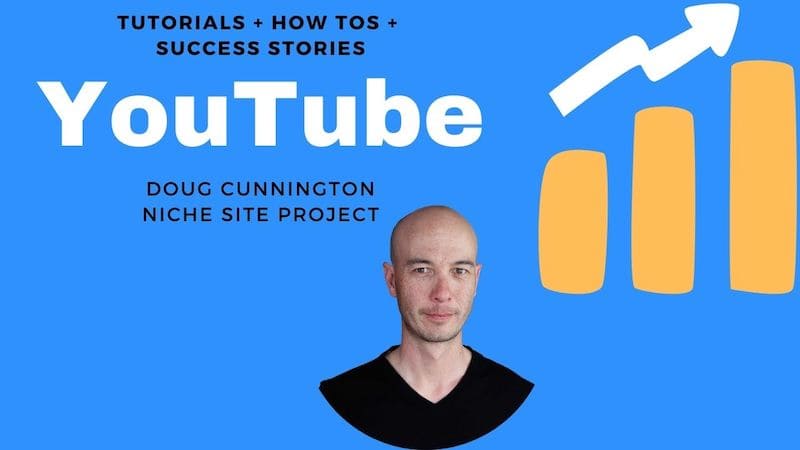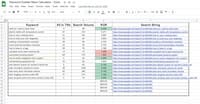Here are some of the most common questions I hear on YouTube, blog comments, and emails.
These are mostly related to Amazon Affiliate Niche Sites, but many of the ideas are universal. I cover WordPress Themes, Hosting, On Site SEO, Off Site SEO, Link Building, and Keyword Research.
So browse around and read them all. 🙂
Be sure to check out the full Amazon Affiliate Marketing niche site process here.
Keyword Research Questions
- What is the Keyword Golden Ratio method?
- I found a great KW but the volume is over 250, should I still write a post?
- What if 2 KGR Terms are similar? What should I do?
- How can you improve your keyword search results?
- I think the Keyword Golden Ratio is great. Where can I learn more?
- When to Target ZERO Search Volume Keywords?
Amazon Affiliate Site Questions
- How Much Do Niche Sites Earn with Amazon Associates?
- Amazon Affiliate websites!
- How much is possible with Amazon Affiliate income?
- How many posts do I need before I launch my niche site?
- How can I get traffic to my Amazon review site?
- How often should I post content for my site?
- How long should the content be on affiliate sites?
- Is it ok to publish multiple posts at once?
- Do you use other affiliate programs?
- Do you use Amazon images?
- Where should I put affiliate links?
- Do you cloak Amazon affiliate links?
- What is the Amazon Associate Disclosure that I should use?
- Do you use sidebars on your site?
- The Amazon Associate Report looks wrong or hasn’t been updated — what gives?
- What’s the Best Call To Action for Affiliate Sites
Site Design and Hosting
- What’s the best WP theme?
- Do you recommend any of the themes specifically built for Amazon affiliate sites?
- How do you speed up WordPress load time?
- Should I use a page builder?
- What do you think of Thrive?
- Which hosting provider should I use for my Amazon Affiliate Site?
- Do you use a table plugin? Which one?
- What plugins do you use?
“Permission” Questions
- Should I start an Amazon Affiliate Site? It seems like there are so many out there already?
- I found a great keyword but the search volume is 5,000 per month. Should I go for it?
Onsite SEO Questions
- How many affiliate links should I have in each article?
- What’s the best keyword density? Or how many times should I use a keyword in my post?
- The Yoast SEO Plugin tells me to use a keyword X% of the time. What should I do?
- How many subheadings (H2 and H3) should I use?
- How many H1 tags should I use?
- Should I use a silo structure on my site?
- What’s the best template for an Amazon Affiliate Review?
Offsite SEO Questions
- What is the Google Sandbox and is it real?
- What are dofollow links?
- What are nofollow links? Do nofollow links help?
- How many links do I need to rank for a keyword?
- How do you do guest posting?
- How to Get Links to Affiliate Posts
Get my personal KGR Calculator Spreadsheet right here…
Services [in progress…]
How to check your rankings in Google? or What tool do you use for SERP tracking?
How much should I pay for a 1,000 word article?
Featured or Mentioned on


The Doug Show is where I’ll talk to other marketers and experts, share success stories, talk about making the leap from corporate worker bee to entrepreneur.
Subscribe here: Apple Podcasts | Spotify
Or go straight to the Website

- Success Stories from readers like you.
- Tutorials and How-Tos.
- Real Life as an Entrepreneur after Corporate Life.
Finding Answers When You Have Questions
When I was taking a CS class on Operating Systems at Georgia Tech, there was this professor that had one of those reputations — like the kind of rep a long-haired, CS guy teaching OS design would have.
I don’t remember jack from the coursework but Professor Greenlee taught an even more important lesson…
On day 1, Greenlee told us the order of operations to find answers to questions.
- Try to find the answer yourself by exhausting all your resources. Check your textbook. Check your notes. Try to look up the answer on a newsgroup. Nowadays, you have so many resources turn to like Wikipedia, forums, user guides, customer support, and so on…
- Ask your peers and friends. Greenlee told us to check with our classmates and friends, maybe even a person that was 1 or 2 years ahead of us.
- Ask the Teaching Assistants during office hours. Of course, these TAs were experienced and generally knew the answers but not always. They were often just a bit ahead of us.
- Check with your deity of choice. This was a joke, of course, but the point was to really try to find the answer on your own. Sleep on it and think about it.
- Ask Greenlee…If, and only if, you tried the 4 previous steps and didn’t find the answer.
Why am I telling you this story of Greenlee? (though it sounded like he didn’t want to answer our questions…)
Aside from being slightly amusing, it’s a guide to find the answers on your own. It’s a trait that’s common with successful people. And when you go through a lot trying to figure things out, 3 things happen:
- You won’t forget the answer.
- You’ll understand the whys and hows and principles.
- If you didn’t figure out the answer, you’ll ask WAY better questions when you do seek help.
Asking Better Questions
Some people will tell you that there are no dumb questions. I don’t know if I agree with that, but the context is very important.
- Let’s say I attend an event and I have the chance to meet Tim Ferriss and chat with him for 2 minutes. It would be silly for me to ask him for advice on how to write a book in that context. There isn’t enough time to tell me anything meaningful or helpful.
- Instead of Tim Ferriss, let’s say I have a chance to meet a former president of the US. It’d be silly to ask what years he was president. I could just look up the answer on my own. In fact, I could ask Siri or Alexa and get the answer in seconds.
Asking great questions is a skill and you can get better at it if you want to. Check out this video by Tim Ferriss to hear his take on it.
This is a list of some really common questions that I’ve heard from new and experienced marketers alike. I’ve done dozens of Livestream Q&A sessions on YouTube so I’ve heard a lot of questions from a lot of people.
Too Many Variables
Some questions are hard because there are too many variables — so it’s very hard to impossible to answer. It’s like predicting the weather…sometimes the answers are just wrong.
At best, you can take action and review the results afterward. Then you’ll have good information for the next time you face a similar problem.
Getting Permission
Other questions are really someone seeking reassurance about trying something. I’ll list those out as well because they are so common. But the reality is:
- If you’re thinking about trying something, you probably should GO FOR IT. After all, most things are reversible so you may as well try it.
- If you have to ask for permission a get approval from someone, then I recommend you get comfortable with being uncomfortable. A lot of entrepreneurship is making decisions with incomplete data.
I’m not suggesting you do things without thinking, just don’t be afraid to make bold decisions and take bold actions.
